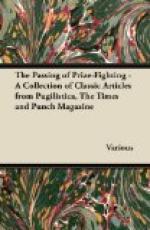“Tell me not, Sweet, I am unkind”
(As Colonel Lovelace
said) if I
From festal scenes for you designed
To solitude propose to fly;
If, when the strident trumpets blare
From Hampstead Heath to Clapham
Junction,
And bunting fills the ardent air,
I don’t assist at that
brave function.
It does not follow, let me say,
That I am loath to give you
cheer;
No, in my unobtrusive way
I hold you very, very dear;
I may not join the loud parade
Nor share the crowd’s
ecstatic tooting,
Yet in your honour I have paid
Twelve guineas for a summer
suiting.
Think not I sniff at common joys
Or that my loyal heart condemns
A nation’s soul expressed in noise
And pageants barging down
the Thames;
Only, while others dance and pant
To hymns that carry half a
mile hence,
I never was a Corybant,
But do my worship best in
silence.
So on your festa I shall be
Away in some sequestered nook,
Some open shrine beside the sea
Where Nature smiles with just
your look;
And lie and let my thoughts go off
To where you come from—which
is Heaven,
And play a quiet round of golf
And go to bed about eleven.
O.S.
* * * * *
The ruling passion.
“Norman is coming to the dance,” said my wife.
“He would prefer to be shot,” I answered.
“You are coming too, and I want you to look after him.”
“I also would prefer to stop one.”
“It will do him all the good in the world. He wants bringing out.”
When Norman is alone with me he is natural and even interesting at times, but in company he is shy and self-conscious and a burden to himself and his neighbours. He is a young dentist with a large practice, and is already a well-known authority on Japanese methods of extraction. Using only his thumb and forefinger he can remove long-established teeth with so much ease and grace and such a quantity of sangfroid that it is a pleasure to watch him at his work. But to a social gathering he comes limp and infirm of purpose; he feels constrained to utter futile remarks with undue emphasis trailing into incoherence; he is dreadful to behold.
I did not see him until the end of the second dance. He was in the ante-room and presented a good example of protective colouring. He was standing with his back to a dark screen, and his pale face and light hair were indistinguishable against a background of flowers worked in gold thread. His attitude as he tightly grasped his programme behind him was that of a wounded dove at bay.
I signalled to him, but, although I was only a few feet away, he could not see me. He had apparently also lost all power of movement. I took him by the arm and led him to the buffet, and, although he never takes alcohol, I felt justified in forcing some brandy between his lips. This revived him a little, and he said in a well-modulated voice: “The surface of the floor is excellent. It is rather warm and oppressive (or cold and chilly). I adore dancing; it both exercises the body and refreshes the mind; but unfortunately I have not had many opportunities of indulging in the art.”




